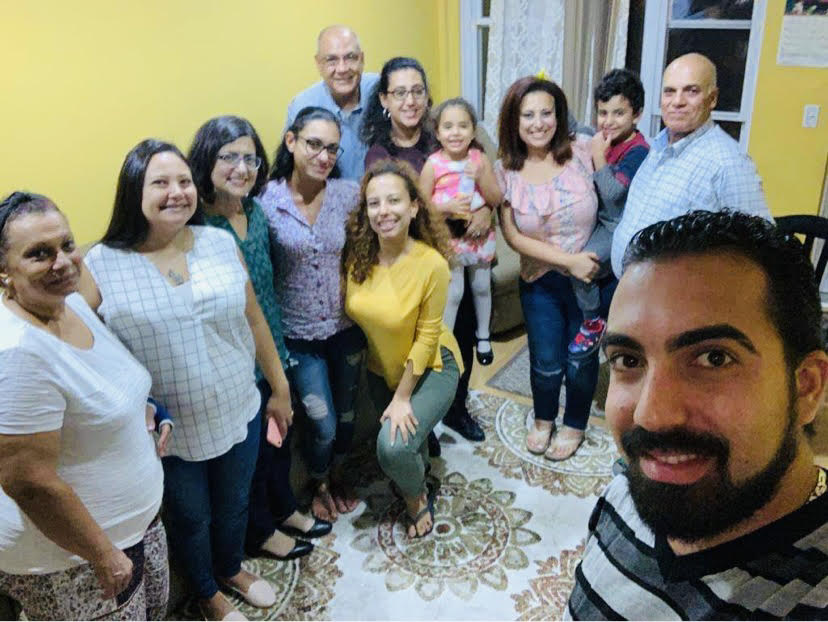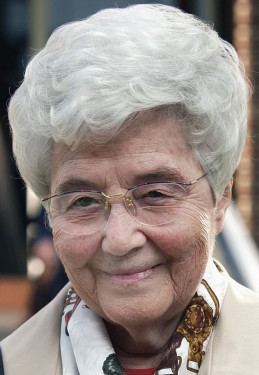
WINDSOR TERRACE — Christian persecution in the Middle East regularly makes the news, but one Christ-follower from Egypt prefers to focus on something else — the Gospel.
Vivian Azer, a lifelong Coptic Catholic now living in Staten Island, confirmed that Christian life in Egypt is “tough.” But that’s all she wanted to say about the conditions there.
Azer explained that listing grievances detracts from the potential for unity among religions — a tenet of the worldwide ecumenical group, Focolare, she joined as a child.
This movement began in 1943 amid the rubble of World War II. While sheltering from bombardments, an Italian school teacher, Chiara Lubich, envisioned a better world without war and hate.
Focolare subsequently evolved into a global facilitator of ecumenical exchanges among diverse religions, races, and nations, including Egypt. Its goal is to fulfill John 17:21, in which Jesus prayed for his followers “so that they may all be one.”
“This,” Azer said, “is actually what I love about Focolare — to love God and everything God has given us. The most beautiful thing is the human being. The common language between all of us is love, and love is God.
“This is how It changed me.”
Jesus in the Midst
Azer, who studied architecture in Egypt, is a construction project manager for the New York City Department of Housing Preservation and Development.
She immigrated to the U.S. a couple of years ago with her parents and her sister, who is married and has a child. They came to join church friends who had already started a tiny community of Egyptian Catholics on Staten Island.
The group comprises eight families with about 40 people, Azer said. Some of them speak only Arabic. To revive their Focolare activities in the U.S., they needed a contact person who spoke the same language.
They found Aline Farkouh, of Bay Ridge, who came to the U.S. 43 years ago from Lebanon, where she first joined the Focolare movement.
“I still speak Arabic,” Farkouh said. “So, when the Egyptian families came here, they reached out. They are wonderful people — very candid and happy. Even with the little that they have, they wanted to keep the spirit of Focolare, the spirit of family, the spirit of Jesus in the midst” (Matthew 18:20).
Focolare is actually the movement’s nickname. The word in Italian means “hearth,” and they want to warm hearts with the “fire of love.” Its official name, however, is “The Work of Mary.” It is among ecclesial movements recognized by the Diocese of Brooklyn.
The Marian Profile
The Vatican’s Dicastery for Laity, Family, and Life estimates that 4.6 million people worldwide follow Focolare at various levels, from strongly committed organizers to occasional visitors.

Most are Roman Catholic, but there are members of other faiths. For example, Farkouh is not Catholic; she worships in the Antiochian Orthodox Church.
And the movement is always led by a woman. In a 1992 interview, Lubich said he had asked Pope John Paul II in 1985 if he agreed with the idea of a woman always holding the Focolare movement’s top position.
She said his response was, “Indeed! I see you (the Focolare) as an expression of the Church’s Marian profile.”
Farkouh explained that Lubich “wanted to be Mary in this world” — not with illusions of grandeur but to serve.
“It means to live as Mary did,” Farkouh said. “It means to do the will of God like Mary did. Mary, desolate, at the foot of the cross, waiting, not boasting of anything. She’s there with her son.”
In 1961, Focolare came to the U.S. and stationed its North American headquarters at Hyde Park, N.Y., about 90 miles north of New York City.
Lubich, born 100 years ago, died in 2008 at age 88. Pope Francis recognized her cause for sainthood in 2015. It has since moved to the Congregation of the Cause of Saints at the Vatican.
The Egyptian group holds its discussions in Arabic and English. Some newer members, like Azer’s fiancé, are U.S.-born Egyptians who haven’t yet learned Arabic, she said.
By learning the scriptures, followers find ways to be like Jesus, which opens doors to serious exchanges between Catholics and other religions to fulfill John 17:21.
For example, in 1997, Lubich visited the Masjid Malcolm Shabazz Mosque in Harlem, where she shared the Gospel and drew similarities between Christianity and Islam. She thus made lasting friendships with Muslims.
Azer said that while her group is mostly Coptic Catholics, it is open to anyone. And it helps anyone. Recently it joined other Focolare members from other boroughs to gather warm clothes and furniture for a Pakistani woman and her son who recently moved to the city.
“Focolare is mainly to practice the Word of God,” she said. “So we are reading and sharing how to apply it in our lives and to do it.
“Let the Bible speak. What I like about Focolare is we are able to get everyone to put his ideas aside and focus on how we are united in love — human beings united in God.
“This is why I chose Focolare; nobody forced me to choose it.”

Long live the memory of the contributions of Chiara Lubich.
Thank you Bill Miller, for this article on the ecumenical work of the Focolare in New York. Surely a concrete witness to God’s plan for all of us to be real brothers and sisters regardless of our Christian religion.
My husband Tom and I lived in Brooklyn for 47 years and brought the Focolare spirituality to numerous families and also to the world of dialogue among people of different religions—Christians, Jews and Muslims. Such deep relationships of unity were created over the years that continue today here in the US and all over the world. A beautiful work of God brought about by Chiara Lubich’s “Yes” to God’s call that brought the Focolare to the lives of so many!
Thank you again for writing this article!